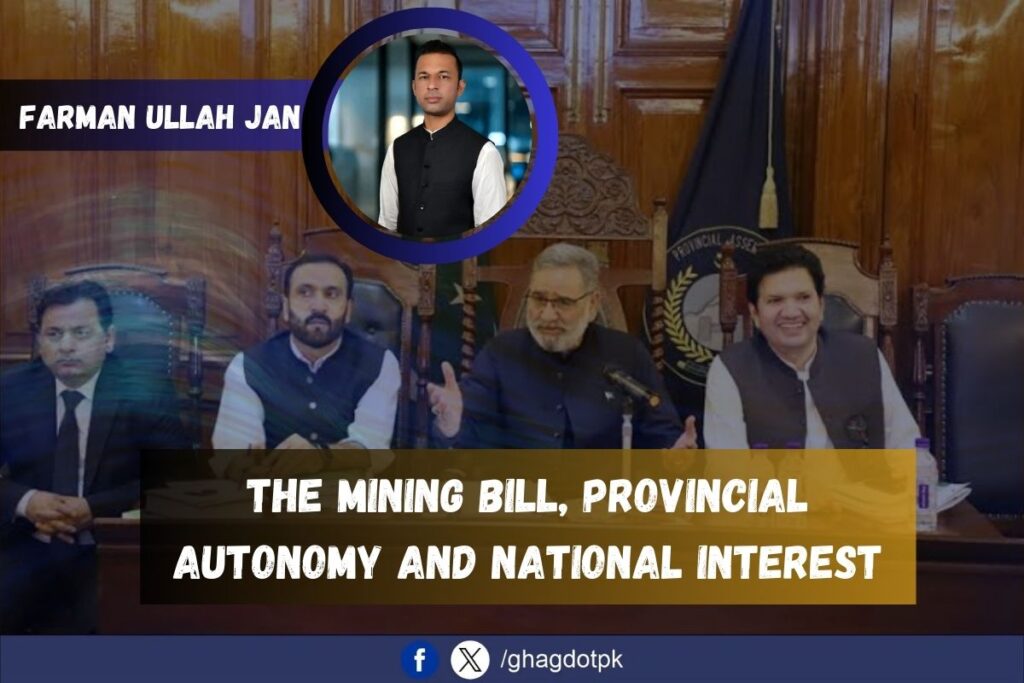By Farman Ullah
The recently held Mineral Summit was declared a success by federal officials. However, behind the positive tone, there’s a growing debate — especially in Khyber Pakhtunkhwa (KP) and Balochistan — over a new mining law said to be drafted under the guidance of the SIFC. Balochistan has already passed a version of this law, while KP is still discussing it.
The timing and secretive process behind this law have raised real concerns. People are questioning whether it follows the Constitution, if it takes powers from the provinces, and what effects it might have socially and politically. In Pakistan, provinces have always had the power to manage minerals.So, it’s understandable that many see this as the federal government trying to take over.
The draft law in KP, while not perfect, keeps key provincial powers. The federal mineral wing is only mentioned in an advisory role, and its advice is not binding. But even including it might open the door to federal control in the future. The law in Balochistan goes further. It gives the federal mineral wing a say in how minerals are developed, licenses are granted, and how finances like royalties are handled. It even seems to take away Balochistan’s right to start its own proposals. This means the province might end up only reviewing decisions instead of making them. While these roles are technically “advisory,” they could still lead to federal interference.
Both KP and Balochistan’s laws allow temporary permits for projects labeled as being of “national interest.” This term is vague and can include licenses for federally owned companies. Such clauses weaken provincial control.
On the positive side, the laws give some powers to new provincial and district-level mineral bodies, instead of leaving everything to high-ranking officials like secretaries and deputy commissioners. However, having two federal representatives with voting rights in these provincial bodies is concerning. They should be observers, not voters.
One big problem with both laws is the lack of involvement from local communities, mining experts, and industry groups. Mining is a complex and risky business, and leaving decisions to only politicians and government officers is not wise. The laws also include weak and vague promises about helping communities and hiring locals. These parts should be made legally binding to ensure people benefit and have a say. In short, the KP law needs some fixes, but the Balochistan law should be withdrawn because it gives too much control to the federal government.
Even more worrying is how these laws were created. The SIFC — a body that doesn’t have a formal role under the Constitution — seems to have led the process with little public input or openness. At a time when both federal and provincial governments are seen as lacking strong public support, this top-down way of making laws only increases mistrust. It may lead to more anger in the provinces, even if the laws themselves seem legal.
Mining is a long-term industry. It needs stable politics, consistent policies, and community approval. But Pakistani politics often focus only on short-term gains, and many past deals — like Reko Diq and IPPs — have ended badly because they were rushed and secretive. Pakistan also doesn’t have the experts or money needed to make fair mining deals that benefit both investors and the public. In this situation, any new foreign-backed mining deals are more likely to benefit a few people quickly, instead of helping the country in the long run.
Also, Pakistan has a poor track record when it comes to sharing mining benefits with communities. Companies’ community programs often do little, and people living near mines usually see no real improvements. These new laws do not do much to change that. What we really need is a new way of thinking — one that puts local people at the center of decisions and profits. To protect community rights and provincial powers, the following steps are important:
Peace and agreement must come first
Foreign companies can’t work well without local support and political stability. CPEC in Balochistan is a good example of what happens without that.
Stop federal overreach
All mentions of the federal mineral wing should be removed. Instead, a council of provinces can be made to share ideas and make joint policies, while keeping each province’s control.
Get community approval
Before starting big mining projects, companies must get the free, informed consent of local communities.
Share money with locals
At least 5% of royalties should go directly to the districts where the resources are found, in addition to the amount given to the province.
Guarantee local jobs
Laws should require that all unskilled jobs go to locals, and at least half of skilled jobs too. Over 10 years, this should rise to 90%.
Create a provincial mineral wealth and development fund. This would include:
A savings fund for future generations, made up of 25-40% of royalties and managed independently.
A community development fund, which pools 5% of district royalties, 3-5% of company profits, and other money to spend on local services and infrastructure.
Make everything transparent. All mining contracts and licenses — including for Reko Diq and Saindak — must be public. Companies connected to political figures should be flagged, and detailed information on royalties, production, taxes, and social programs should be published often.
Pakistan is at a turning point. It can either keep repeating the mistakes of secretive, centralized, and top-down resource management — or it can build a new model where mining helps everyone and is led by the people most affected. Without transparency, accountability, and respect for provinces and communities, no summit — no matter how flashy — will bring real progress.






